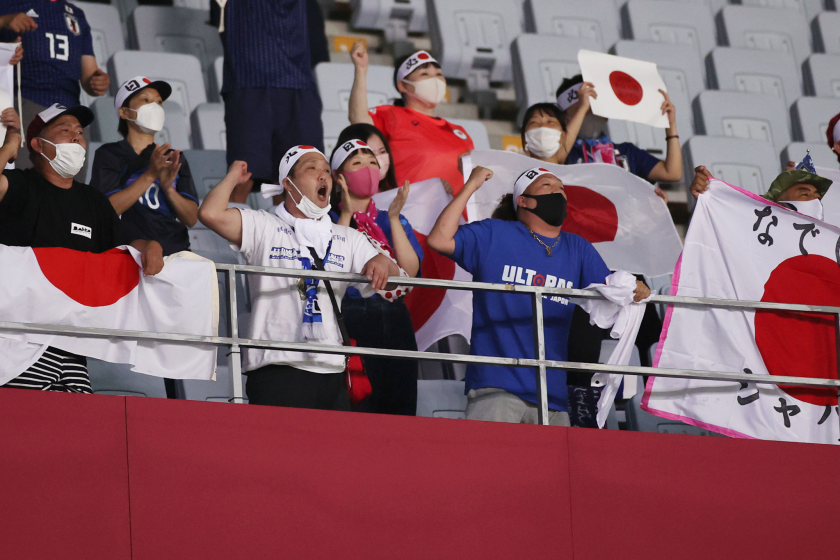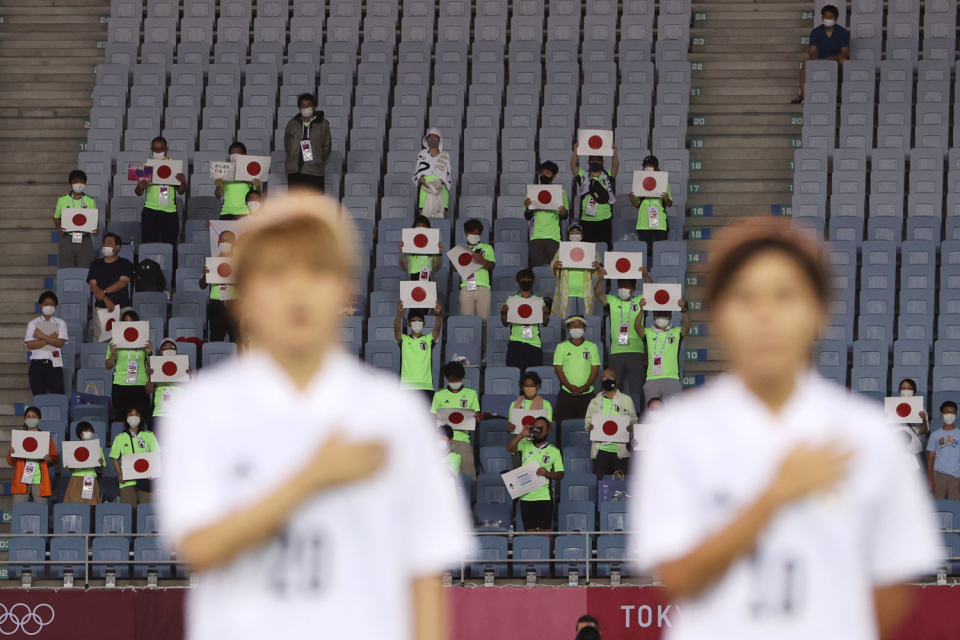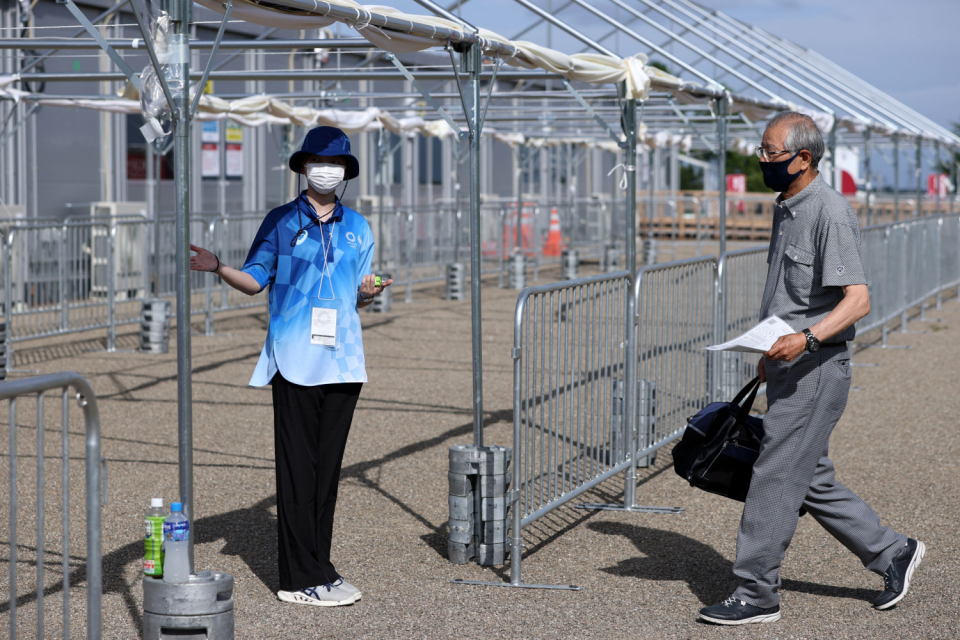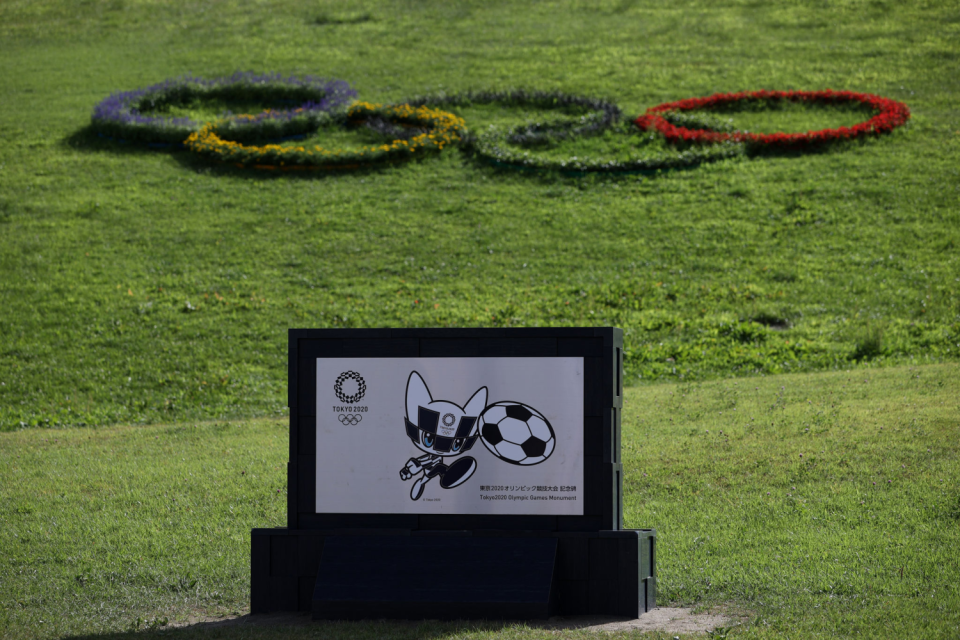Hernández: Even with fans at some events, the Olympic spirit remains elusive in Japan

Signs along the highway warn of the predator that roams the forest: the Asian black bear.
Bear attacks are somewhat common in Japan, with more than 140 reported over a six-month period last year. This part of the country is familiar with such incidents, which often take place in autumn when people venture into the woods to harvest wild mushrooms.
With the metropolis of Sendai nearby, this isn’t the middle of nowhere, but this isn’t Tokyo, either.
A search for the elusive Olympic spirit brought me here, some 200 miles north of the center of the Games, to a crescent-shaped concrete block that was designed to resemble the helmet of one-eyed feudal warlord Date Masamune.
If there was a place and time the Olympics would be the shared experience they were intended to be, it would be at Miyagi Stadium on Tuesday night.
Nadeshiko Japan, the popular women’s national soccer team, was playing a must-win group-stage match against Chile.
The game would be played in front of a crowd.
Several prefectures outside of Tokyo are hosting events in these Games, but Miyagi is one of only two that are welcoming ticketed fans. The other is Shizuoka, the site of multiple cycling competitions.
The greater Sendai area is best known as the birthplace of gyutan, or grilled beef tongue, and a Tanabata festival that attracts 2 million visitors every July. Sports are also a significant part of the local culture.
Sendai is the home of the Rakuten Golden Eagles, the baseball team that employs former New York Yankees pitcher Masahiro Tanaka. Two-time Olympic figure skating champion Yuzuru Hanyu is from Sendai. Hideki Matsuyama, the first Japanese golfer to win the Masters, went to college here.

The area is also home to Tohoku High, a national baseball powerhouse whose graduates include current and former All-Star pitchers Yu Darvish, Takashi Saito and Kazuhiro Sasaki. Saki Kumagai, the captain of the women’s soccer team, also went to school in Sendai, at Tokiwagi High.
Miyagi and Fukushima were included in the plans for Tokyo 2020 to celebrate the purported recovery from the earthquake and tsunami that devastated the Tohoku region in 2011.
The elements were in place to create the kind of Olympic atmosphere that has been painfully absent in Tokyo.
While Tokyo recorded a new single-day record with 2,848 new reported coronavirus infections on Tuesday, Sendai was still permitting its restaurants to serve alcohol and remain open until 9 p.m.
In Tokyo, there’s a ban on the plaza-packing public viewings that typically happen during Olympics and World Cups. The competition sites have become oversized versions of the streets and buildings in Los Angeles that are taken over to film a television program, which is what these Games are. Life goes on as usual in the unaffected parts of town.
As I was finalizing plans to ride the Shikansen bullet train to Miyagi, the Japan Meteorological Agency predicted Typhoon No. 8 was headed north.
Specifically, to Miyagi.
Of course. The Games were a giant mess. Why wouldn’t a typhoon potentially ruin a signature event?
Turns out it didn’t have to. The coronavirus already did that.

The only tickets distributed were sold before the pandemic, before anyone knew which teams would play on what days. Many of the tickets were returned when the Games were postponed by a year and refunds were offered. Earlier this year, a decision was made to not sell any more tickets.
Authorities imposed a 10,000-spectator limit, but the safeguard was entirely unnecessary.
Journalists and staffers stationed here said the crowd on Tuesday looked like the smallest of the three to which Miyagi Stadium had opened its doors, and the first women’s soccer doubleheader attracted only 2,000 fans.
In retrospect, it made sense there were as few Olympic-related signs in Sendai as there were in Tokyo.
The National Stadium is in Shinjuku, a trendy part of Tokyo. A person could see or run into it on the way to doing something else. Here, with Miyagi Stadium in the outskirts of town, there was no chance of that.

“People here are like, ‘Go ahead with the Games, but don’t expect me to care,’” said a Sendai-based reporter for a national publication who asked to not be named because he thought his conservative newspaper wouldn’t want him to say anything negative about the Olympics.
It’s not as if they had the choice to attend, which they probably would have.
More than 38,000 spectators were at Miyagi Stadium for an exhibition game against El Salvador in 2019 that marked the men’s senior national team debut of the then-18-year-old “Japanese Messi,” Takefusa Kubo.
In the opening game of the doubleheader on Tuesday, Sweden defeated New Zealand, 2-0.
The main event was more competitive than expected, with a physical and defensive-minded Chilean team turning back wave after wave of Japanese attacks. Chile nearly went ahead on a 69th-minute header by Francisca Lara that struck the bottom of the crossbar, but the ball was ruled to have not entered the goal after bouncing on the goal line. Japan finally broke through in the 77th minute when substitute Mina Tanaka was played behind Chile’s defensive line by Mana Iwabuchi and chipped the ball past goalkeeper Christiane Endler.
With the victory, Japan finished third in its group and advanced to take on Sweden in the quarterfinals.
The Japanese players later said they were grateful for the spectators.
“For me personally,” Iwabuchi said, “my parents, friends and people who ordinarily take care of me were able to come and watch. I think I’m very fortunate to be able to play in front of people like that in an Olympics that are in Tokyo.”
Except what’s special about Olympics are how they make complete strangers feel as if they’re family members or friends of the athletes they’re cheering on. The Olympics and World Cup distinguish themselves from every other sporting event by the number of people they bring together.
That’s what’s missing in Tokyo, and that’s what’s missing in Miyagi or any of the other sites.
On Tuesday night, the empty seats symbolized a suspicion that’s gradually come into sharper focus over the last week: These Olympics never had a chance.
This story originally appeared in Los Angeles Times.

